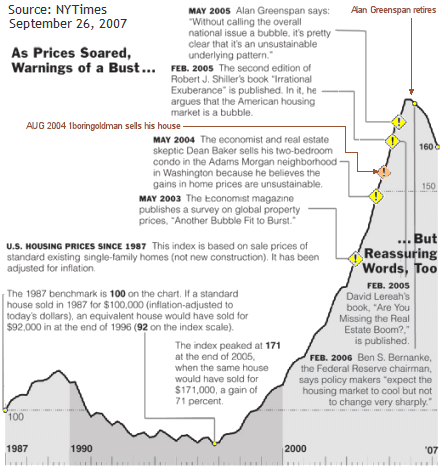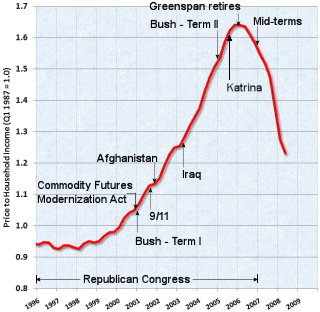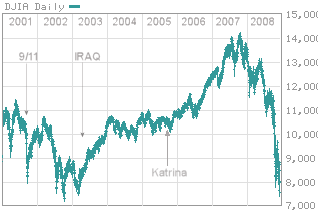THE rapid house-price inflation in many countries over the past few years is clearly unsustainable. But will house prices just flatten off or will they slump? Alan Greenspan, who criticised the stockmarket’s “irrational exuberance” long before that particular bubble was fully inflated, is more sanguine about American house prices. He accepts that there are local hot spots, but dismisses the idea of a national housing bubble that could harm the whole economy if it bursts.
In other countries where house prices have been rising, many analysts also pooh-pooh the idea of a bubble. They point out that interest rates are low, so people can afford to borrow more and are therefore willing to pay more for a home. The affordability index—mortgage-interest payments on an average-priced home divided by average income—is still quite low by historical standards in most countries…

ALAN GREENSPAN, the former Federal Reserve chairman, acknowledged in a Congressional hearing last month that he had made an “error” in assuming that the markets would properly regulate themselves, and added that he had no idea a financial disaster was in the making. What’s more, he said the Fed’s own computer models and economic experts simply “did not forecast” the current financial crisis. Mr. Greenspan’s comments may have left the impression that no one in the world could have predicted the crisis. Yet it is clear that well before home prices started falling in 2006, lots of people were worried about the housing boom and its potential for creating economic disaster. It’s just that the Fed did not take them very seriously.
For example, I clearly remember a taxi driver in Miami explaining to me years ago that the housing bubble there was getting crazy. With all the construction under way, which he pointed out as we drove along, he said that there would surely be a glut in the market and, eventually, a disaster.
But why weren’t the experts at the Fed saying such things? And why didn’t a consensus of economists at universities and other institutions warn that a crisis was on the way? The field of social psychology provides a possible answer. In his classic 1972 book, “Groupthink,” Irving L. Janis, the Yale psychologist, explained how panels of experts could make colossal mistakes. People on these panels, he said, are forever worrying about their personal relevance and effectiveness, and feel that if they deviate too far from the consensus, they will not be given a serious role. They self-censor personal doubts about the emerging group consensus if they cannot express these doubts in a formal way that conforms with apparent assumptions held by the group…From my own experience on expert panels, I know firsthand the pressures that people — might I say mavericks? — may feel when questioning the group consensus. I was connected with the Federal Reserve System as a member the economic advisory panel of the Federal Reserve Bank of New York from 1990 until 2004, when the New York bank’s new president, Timothy F. Geithner, arrived. That panel advises the president of the New York bank, who, in turn, is vice chairman of the Federal Open Market Committee, which sets interest rates. In my position on the panel, I felt the need to use restraint. While I warned about the bubbles I believed were developing in the stock and housing markets, I did so very gently, and felt vulnerable expressing such quirky views. Deviating too far from consensus leaves one feeling potentially ostracized from the group, with the risk that one may be terminated…
In 2005, in the second edition of my book “Irrational Exuberance,” I stated clearly that a catastrophic collapse of the housing and stock markets could be on its way. I wrote that “significant further rises in these markets could lead, eventually, to even more significant declines,” and that this might “result in a substantial increase in the rate of personal bankruptcies, which could lead to a secondary string of bankruptcies of financial institutions as well,” and said that this could result in “another, possibly worldwide, recession.” I distinctly remember that, while writing this, I feared criticism for gratuitous alarmism. And indeed, such criticism came.
I gave talks in 2005 at both the Office of the Comptroller of the Currency and at the Federal Deposit Insurance Corporation, in which I argued that we were in the middle of a dangerous housing bubble. I urged these mortgage regulators to impose suitability requirements on mortgage lenders, to assure that the loans were appropriate for the people taking them. The reaction to this suggestion was roughly this: yes, some staff members had expressed such concerns, and yes, officials knew about the possibility that there was a bubble, but they weren’t taking any of us seriously…
Why do professional economists always seem to find that concerns with bubbles are overblown or unsubstantiated? I have wondered about this for years, and still do not quite have an answer. It must have something to do with the tool kit given to economists and perhaps even with the self-selection of those attracted to the technical, mathematical field of economics…
In addition, it seems that concerns about professional stature may blind us to the possibility that we are witnessing a market bubble. We all want to associate ourselves with dignified people and dignified ideas. Speculative bubbles, and those who study them, have been deemed undignified. In short, Mr. Janis’s insights seem right on the mark. People compete for stature, and the ideas often just tag along… Unless Mr. Greenspan was exceptionally insightful about social psychology, he may not have perceived that experts around him could have been subject to the same traps.


By my reckoning, the period of the expanding housing bubble was during the ‘Big Sleep‘ era. People weren’t just ignoring the Housing bubble, or Robert Shiller’s warnings, we were ignoring everything. We ignored the lies that got us to Iraq. We ignored Gitmo, and Torture, and Domestic Spying, and the C.I.A. Leak, and the hubris of Signing Statements, and the abuse of Executive Privilege, and the D.O.J. being run by unqualified [and, as it turned out, unscrupulous] people, and … well, you know, we ignored that we had elected some incompetent [and some devious] people to the White House. We were asleep in part because we were afraid, but also because we were being fed poppy blossoms on a daily basis. Shiller’s wrong about Greenspan. Greenspan’s professional narcissism may have been a factor. Worse though, he was part of creating the ‘Big Sleep‘ himself, maybe innocently, but that doesn’t matter at this point. He didn’t want to see what Shiller was showing him. I think when he finally ‘woke up,’ he retired. That’s what I think, anyway.
Sorry, the comment form is closed at this time.